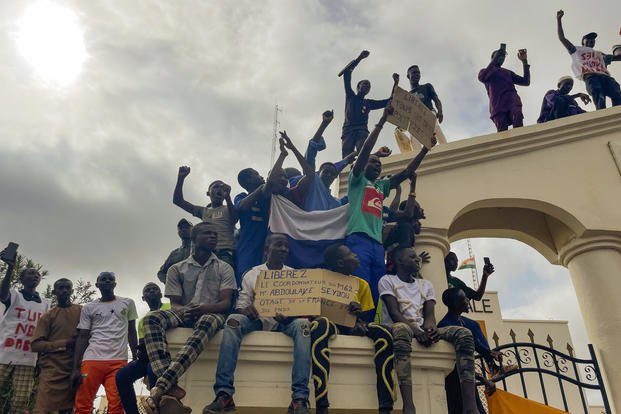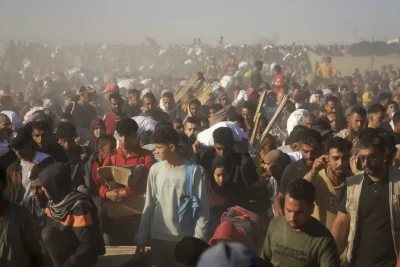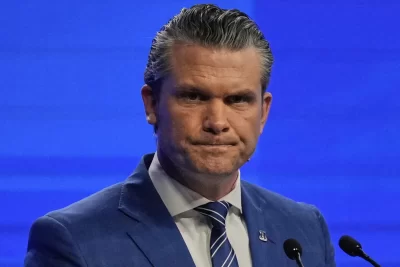
The French troops withdrawing from Niger were seen as a key line of defense for about a decade in Western efforts against jihadi violence in Africa’s Sahel region, the vast arid expanse south of the Sahara Desert.
As the U.S. keeps pushing for a diplomatic solution to resolve Niger’s political crisis, analysts say the country’s junta might struggle to sustain its relative peace with no external support.
French President Emmanuel Macron has agreed to withdraw France’s ambassador and troops from Niger after the July coup that deposed its elected president and triggered anti-French sentiment in the former colony. In response, the junta welcomed the end of “imperialist and neo-colonialist forces” and said Monday that the withdrawal must follow a “negotiated framework and mutual agreement.”
After a two-month standoff with Niger’s coup leaders, French Ambassador Sylvain Itte returned Wednesday to Paris, the French Foreign Ministry said. Itte met upon return with the French foreign minister, who thanked him and the other embassy employees for continuing to work “in difficult conditions.’’
U.S. Defense Secretary Lloyd Austin said in Kenya on Monday that Washington’s desire is for Niger’s political crisis to be resolved through diplomatic means and that the United States will “continue to evaluate for any future steps that would prioritize both our democratic and our security goals.”
Many of the attacks in the region occurred in Niger’s neighbors, Burkina Faso and Mali, and the relative peace it enjoyed as well as the line of defense it hosted — through Western support — could be further endangered, analysts say.
“The departure of the French means that the burden for providing security will more clearly rest with the government of Niger itself,” said Nate Allen, an associate professor at the Africa Center for Strategic Studies. “If the track record of military regimes in Mali and Burkina Faso are any indication, the main beneficiaries of military governments are the jihadists.”
In a region where democracies are fast eroding, Niger was seen as the last remaining Western partner in the decade-long fight against jihadi groups that over the years have seized territories, massacred civilians and battled foreign armies in the Sahel. The coup has also raised questions about whether the country would seek the help of the Russian private mercenary group Wagner, which already operates in some African countries, including Mali, where human rights groups have accused its forces of deadly abuses.
France has 1,500 military personnel in Niger, which had been envisioned as the base for counterterrorism operations in the region after anti-French sentiment grew in Mali and Burkina Faso, both run by juntas that have also forced French troops out.
For the U.S., Niger hosted 1,100 of its military personnel in regional outposts for wide-ranging patrols by armed drones and other counterterrorism operations against Islamic extremist movements.
While Washington has “remained less visible in the management of Niger’s internal policies,” France has interfered, said Insa Garba Saidou, a local activist who assists Niger’s new military rulers with their communications.
Saidou said the request for the French to leave was because of three reasons: “France’s failure in the fight against terrorism in the Sahel; France’s interference in issues of Niger’s internal policies (and) the idea that France, through the CFA franc (used as the local currency in many of France’s former colonies), is the basis of underdevelopment in Africa and Niger in particular.”
French troops aren’t expected to pull out of Niger until the end of the year, but Western counterterrorism efforts have effectively been stalled since the coup. While the U.S. military only recently resumed missions out of its bases in Niger, its reluctance to declare the events in Niger a coup or take significant actions is seen as proof of the importance Niger plays in counterterrorism efforts in the Sahel and East Africa. A senior U.S. diplomat was also sent to Niger days after the military seized power.
“A lot will depend moving forward on what type of relationship the U.S. has with the junta (as) … the U.S. will at some point likely admit that this is a coup,” said James Barnett, a researcher specializing in West Africa at the U.S.-based Hudson Institute.
Much would also depend on whether the junta decides to sustain ousted President Mohamed Bazoum’s security strategy, Barnett said, pointing out that Niger’s relative security success compared to its neighbors was a result of its strategy of “taking a more calibrated approach to counterinsurgency” during Bazoum’s presidency.
With a different security mission in Niger, the U.S. won’t likely seek to fill the gap left by France, analysts say.
Washington’s continued presence in Niger alone serves a mutual interest, according to Nathaniel Powell, Africa analyst at the Oxford Analytica geopolitical intelligence firm. For the U.S., it helps it continue to gather intelligence in Libya and regionally on armed groups, and for Niger, the government’s local military capacity to fight jihadis would be bolstered, Powell added.
But he warned that the U.S. needs to watch out for how the situation unfolds under the junta.
“They are more vulnerable now since the sustainability of their presence depends on a cooperative junta whose future is unclear and whose stance towards foreign intervenors could change according to circumstances,” Powell said of the U.S.
“They also, depending on the extent of their cooperation, risk becoming indirectly complicit in the junta’s crimes if the latter decides to take a more aggressive and ethnically targeted approach to fighting jihadists as the Malian junta has done.”
Niger has signed a security collaboration pact with Burkina Faso and Mali, both of which have struggled under military governments to fight jihadi violence in their countries. The agreement, though, was more to aid Niger to defend against any possible regional military intervention to reverse the coup, analysts say.
“The rhetoric of all the juntas (in the Sahel) is focused on national sovereignty and self-reliance,” said Oxford Analytica’s Powell. “Wagner can’t offer the same kind of capacity improvements and force multiplier effect that France could.”
___
Associated Press journalists Evelyne Musambi in Nairobi, Kenya, and Matthew Lee in Washington, D.C., and Angela Charlton in Paris contributed to this report.






